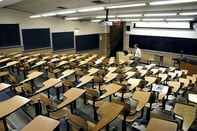Published on
The State of Higher Education
Equipped with the US high-school diploma, I returned home and decided to continue my higher education at a university in Europe. To my surprise, I was told that with the US high-school diploma, I need to complete two more years of college and then try to re-apply. When I asked why, I was told that university’s administration thinks that US high-school degree does not prepare me for the rigors of the Italian university demands (I was applying for a degree in economics).
The above story gave me a good view of the US education system even at my younger age. The education system in this country (US) is very complex due to the size and population of the country. At any level, from pre-school, K-12, to college and graduate programs, quality can vary significantly. Thus, to generalize that higher education is “weak” or “poor” is simply not true. However, it is a fact that there are a very large number of high schools here that provide low quality education to its students. The reasons are multiple; bad teachers, uninterested students, unmotivated parents, unqualified administrators, etc…For instance, back in my native country, almost all of my high-school teachers held degrees in the subject areas in which they were teaching. My biology professor finished a biology degree from the University of Biological Sciences, not from the University of Education with a focus on biological sciences.
My point is that too many high school graduates come to colleges and universities unprepared as learners.
I see colleges/universities in the US almost as a catch-up places where many students still have to learn how to properly write and talk, or learn how to do the basic math or chemistry. Obviously, there are high-quality high schools in the US and many of these students will end up going to great institutions of higher learning, but these are small percentages. This article discusses the larger percentages.
What happens in many colleges in the US that do accept students with average SAT scores or open door policies? That’s a good question. Regardless if the school is private or public, they still depend on the tuition revenues. In today’s economy, when states are lowering their budgets for higher level education, public colleges depend even more on the tuition revenues. Many of those schools are quasi private institutions now. Tuitions fees have been rising much faster than annual inflation rates, which makes education a very expensive item, and even with scholarships and fellowship, students are forced to borrow and/or work to pay for it. One of the consequences to expensive education is the fact that students feel that they are customers and two, they also have to work, which gives them less time to study and learn.
Assuming the customer status, they expect certain rights and privileges that were uncommon a decade ago. “Customer is always right” is a concept where college administration and its faculty often clash. To the administration, students are a positive cash flow, and keeping them around until their graduation is very important. On the other hand, most of the conscious faculty with doctoral degrees will demand academic standards from these students, and here is a potential for a conflict – poor grades do not help with the retention rates. Low retention rates cause weak source of steady revenue.
It is thus easy to see why many colleges place very strong emphasis on student evaluations as a means of evaluating its faculty. Most of the research does show that these evaluations are correlated with easiness of the class, faculty and grade assignments. Incentives are a driving force of human behavior. We should expect faculty therefore to lower the learning demands and inflate the grades. Returns to higher education, on average, are still very high, but, they have not increased much in the past ten years. Perhaps, we are graduating too many uneducated students.
Finally, technology is making very large strides in the higher education. Just like non-traditional programs (such as night school for working adults), now on-line education is gaining popularity. The question is; is the trade off to convenience a reduced quality of higher education? This is a topic I would be happy to address in another article, but it seems logical that it would be very difficult to substitute a professor and a classroom environment to a virtual environment.
Author Perspective: Educator



